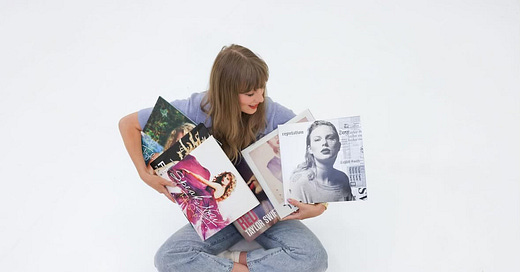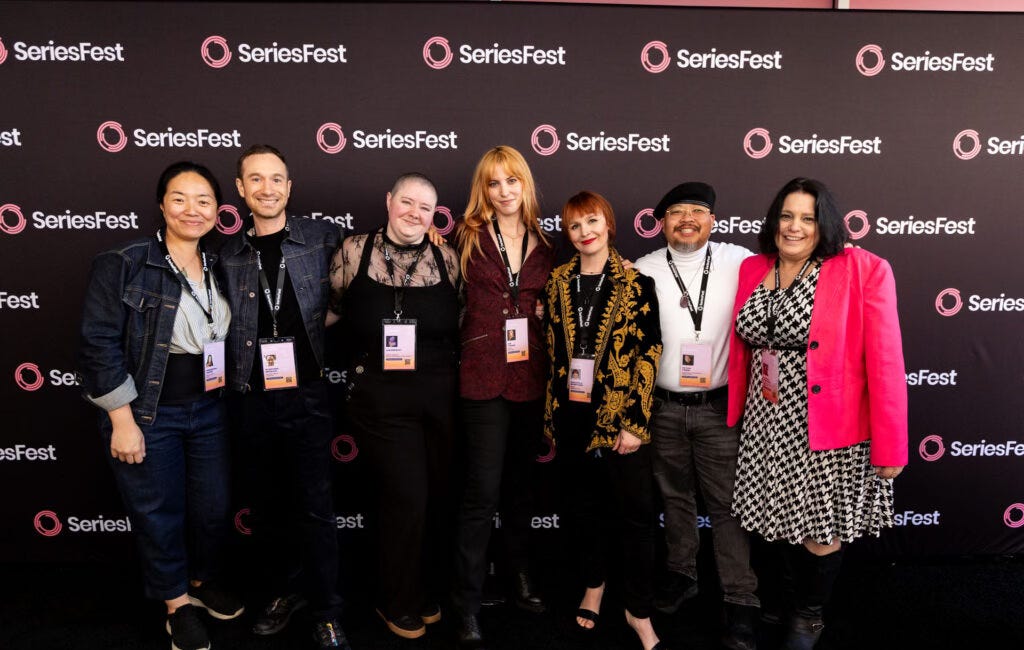Create Your IP Universe
My third, and biggest takeaway from SeriesFest. Success is no longer "selling a show" or "selling a pilot." Has the definition of "success" changed? How are you finding your audience?
Taylor Swift bought back her master albums and her universe. Her entire IP universe. At 9:30 PM, I stared at my laptop knowing I had not yet released a Substack this week since I was on vacation in Hawaii, demolished by a redeye, and then accosted by my embarrassing inbox upon returning from “out of my work-from-home-office.” And then I said to myself… if I ever want to have a fraction of the impact of Taylor Swift, I can write a Substack. She’s probably written another song tonight.
While I shut my laptop off almost the entirety of vacation, my brain wheels were spinning a lot thinking about SeriesFest, audience, IP, verticals, and where everything is headed. My best and worst quality, is that I am always thinking of how things could possibly shift by the time something I make comes out, which is both good in thinking long term of shifts so I’m not building on the wrong planet, but also a hindrance, of “is there a point in doing anything?” But the conclusion I’ve come to, is that no matter what I do, or where I do it, if I am not focused on building an audience and community, it might not matter.
With my laptop closed and shut down, also enjoying a vacation, and my hotel room television on both Big island and Oahu lacking smart TV/streaming features (we had to rent DVDs in the hotel) I resorted to scrolling and watching verticals in the evening before bed. I am FASCINATED at the viewership and how they have created community and continue to grow. The first “Verticon” is taking place this year with fan-favorite shows, actors and actresses. Directors and producers are talking about their process making verticals. The universe is exploding in growth. And it’s only one arm.
My biggest takeaway from SeriesFest, was to create your IP Universe. There’s a lot of reasons that Taylor Swift re-recorded all her albums and wanted to buy back her albums, photos, videos, music videos, tour footage, etc from her first albums: she wants creative ownership and full ownership of her IP.
At SeriesFest, the conversations went far beyond film and television. How were platforms, shows, creators, and actors building audience and community? Where is viewership? How should creators be observing the world and the future?
With so many of the “traditional pathways” ending, and the massive shift in eyeballs and attention to verticals, YouTube, and video games, what does this mean for television?
Why does Sony make video games and movies and television?
Sony builds an audience for their moves and television through the video games they create, and through the fandom and community that emerges out of those games and universes.
Writers are releasing their novels on Substack or other platforms, building an audience, and then licensing the IP to studios (think “The Kissing Booth”).
The #1 revenue for crowdfunding on IndieGo is for video games (according to the video game exhibit in the MoPop museum).
Animators and storytellers are using WEBTOON’s to release their stories and build community.
We can keep pitching to Hollywood, or we can build and create our own audience, try and test ideas, and see if it can translate to other formats or longer formats. (Read “Should You Pitch to Hollywood?”)
I don’t know anyone my age that pays for cable anymore.
The only people I know that regularly watch the Hallmark channel (and linear TV for that matter) are over the age of 55.
Most of my friends watch Youtube or Tiktok more than streamers.
Nickelodeon and Disney are now testing new content on YouTube before using the money to film the show.
Maya Lopez posted on Tiktok everyday before her show was turned into a Netflix Series.
The more studios are afraid of taking risks, the more they are looking to creators who bring an audience.
In my deep dive into verticals, many things have struck me, but especially the change in the influence of having a “name” or a celebrity. What will that definition entail?
Interview with CEO of ReelShorts, Joey Jia in TIME Magazine:
However, in film production, they have to pay a premium, or extra to hire a celebrity. They rely on celebrities to bring more traffic. Most of their budget goes to celebrities. But we don't hire celebrities. We spend almost every single penny on our story. We're using the story to drive traffic. They're using celebrities to drive traffic.
This brings up another question: How do we know if the audience will translate across formats?
Will a vertical audience read a book?
Will a book audience look at a WEBTOON?
Will a video game audience play the game?
Will a Substack audience watch the series?
Will a YouTube audience attend an event in person?
But, no matter what, and something Shondaland did brilliantly, is to find a way to connect as many universes as you can too harness audience, and retain ownership of as many offshoots as possible rather than giving that up to legacy media companies who could crumble as older generations die off and broadcast television (and all of that ad money) potentially dries up and relocates to other places.
How can your pilot translate as a video game? A novel? Can you make a proof of concept or shorter videos for YouTube? Could you test out vertical videos on Tiktok, IG, and YouTube shorts? How can you begin to build your IP Universe?
Everything is shifting. Can you be open to thinking beyond the possibilities and the prospects that may not yet even exist?
PS - We are releasing our pilot as a novel (SeriesFest 2025 Pitch-A-Thon Official Selection) chapter by chapter on Substack. If you like historical fiction, burlesque, and horror with feminine rage, you might be a fan.
If you want to read the first article:
SeriesFest takeaways and the future of entertainment
One of my writing partner’s, C.J. (SeriesFest alum of 2022), described SeriesFest as a creative orgy for six days, followed by a depression hangover.






